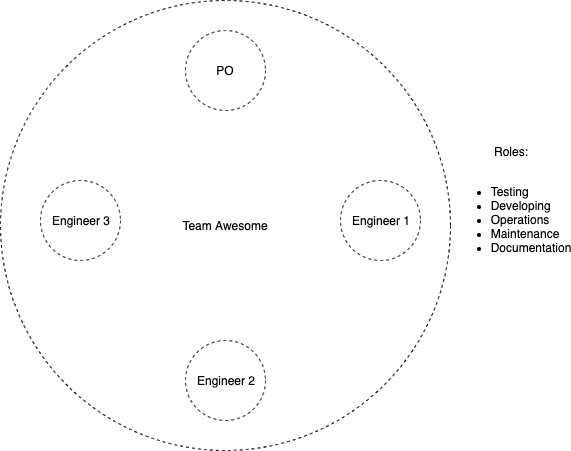Starting Out
The first short post on putting a team together
I have started to think about how we work together and is there another way to do things. This first article is hopefully nothing new. I think we all want to move forward and work better together but this should hopefully be the groundwork for more posts to come. This article is how I would go about putting a team together. The following articles should go deeper into the high-level ideas I have mentioned in this article.
Firstly some ground rules, this is not an agile article I am not an agile coach, in fact, I would declare myself as a not agile enthusiast and coach (if someone wants to hear what I am saying). That is not to say that I am anti agile I am just anti misuse of agile so to get past that I will not relate anything I say here to being agile. Secondly for any good teamwork to happen you need to have the following things:
- Trust (in yourself and your teammates)
- Honesty
- Belief (in yourself, your teammates, and the objective)
Hopefully, this is self-explanatory and nothing new for if you can not trust and be honest within your team and you have no belief in what you are doing how can you produce great software. The team I want to build needs to be self-sufficient I have no time for managers or power-hungry middlemen or yes men. I also have no time for the pink and fluffy flat hierarchy that I have experienced a few times. What you need is a ripple hierarchy that is to say a team that has grown natural leaders this does take time. While you are waiting for the natural leaders to develop a caretaker leader can be in play whose sole purpose is to build and develop the team until the natural leaders appear. A caretaker position is temporary and has a massive responsibility within the team so chose wisely when fulfilling this role.
A bit of a warning here do not expect miracles to happen straight away that just doesn’t happen work will not stop but it may become slower than before this happens with all new ways of working it is something you have to think about and make sure everybody is aware of this fact. You have to be willing to take hit in some places to be able to grow amazing teams but the value you will get back once it has been put together is tenfold.
Before getting anybody into a team you need to think about the values and the culture of the company. You need to be able to spread these values and the culture into the team from day one as this is the glue that will start to bond your team together. If you put a team together that don’t know or believe in the values or buck against the culture then they will not be personally invested in the end result this lowers the chances of being able to put a great team together and the quality of the output will not be as high as it could be.
I would start with only four people in your team this helps with building up trust and being honest as it makes communication amongst the members easier. A four-person team with truly cross-functional skills can achieve more than you would expect especially given time and space to grow and develop as a team. The team as I may have mentioned will be entirely self-sufficient also they would not be judged as individuals but as a team so they should be more invested in bonding and growing as a team. So we have four people in a team we now need to grow that team this is what my next articles will be about following the first four weeks of the team getting together.
The only role I would fulfill as a one person job is that of the Product Owner, now is a good time to point something out this is not scrum while the caretaker role is similar to a scrum master role and the PO role would be probably exactly the same as the PO role in scrum this is not scrum. The difference is that I am not saying how the team should organise work I am showing how we can put a great team together. The caretaker role is short lived six months at the most and is there to help bond the team and grow leaders.
So I have fulfilled one role with one person I now have three spaces left for these I would hire general Software Engineers that is to say I would hire some engineers who had a mixed experience with developing, testing and operations. I would not hire a developer and a tester and a DevOps/Operations engineer. I would hire people who may have more experience in one area but they would need to show experience or willingness to learn about the other areas as the team is completely self-sufficient they will need to help each other out.
For now, we have assembled the following:

I have not shown the caretaker position as this is temporary, in the next article I will go through some first week things we can do with the team and how the caretaker role is used.